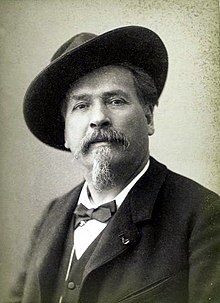Frédéric Mistral
| Frédéric Mistral | |
|---|---|
 |
|
| Born |
8 September 1830 Maillane, France |
| Died | 25 March 1914 (aged 83) Maillane, France |
| Occupation | Poet |
| Nationality | France |
| Notable awards |
Nobel Prize in Literature 1904 |
Frédéric Mistral (French: [mistʁal]; Occitan: Frederic Mistral, 8 September 1830 – 25 March 1914) was a French writer and lexicographer of the Occitan language. Mistral received the 1904 Nobel Prize in Literature "in recognition of the fresh originality and true inspiration of his poetic production, which faithfully reflects the natural scenery and native spirit of his people, and, in addition, his significant work as a Provençal philologist". He was a founding member of Félibrige and a member of l'Académie de Marseille.
His name in his native language was Frederi Mistral (Mistrau) according to the Mistralian orthography or Frederic Mistral (/Mistrau) according to the classical orthography.
Mistral's fame was owing in part to Alphonse de Lamartine who sang his praises in the 40th edition of his periodical "Cours familier de littérature", following the publication of Mistral's long poem Mirèio. Alphonse Daudet, with whom he maintained a long friendship, eulogized the "Poet Mistral" one of his "Lettres de mon moulin".
Mistral was born in Maillane in the Bouches-du-Rhône département in southern France. His parents were wealthy landed farmers. His father, François Mistral, was from Saint-Rémy-de-Provence. His mother was Adelaide Poulinet. As early as 1471, his paternal ancestor, Mermet Mistral, lived in Maillane. By 1588, the Mistral family lived in Saint-Rémy-de-Provence.
...
Wikipedia
